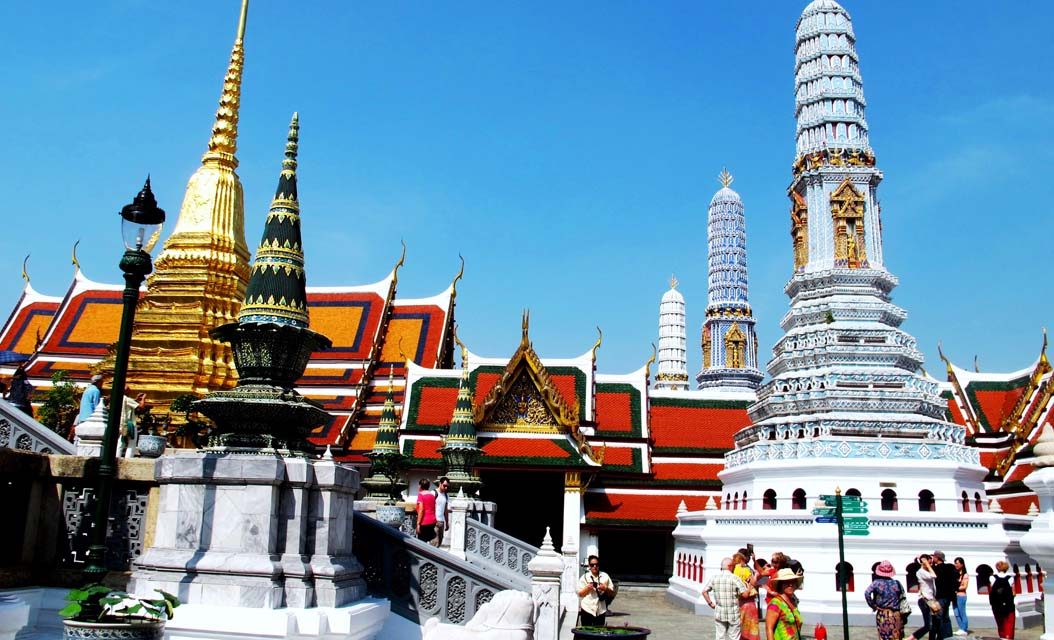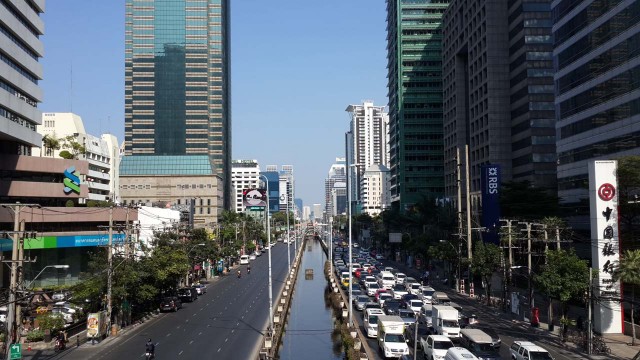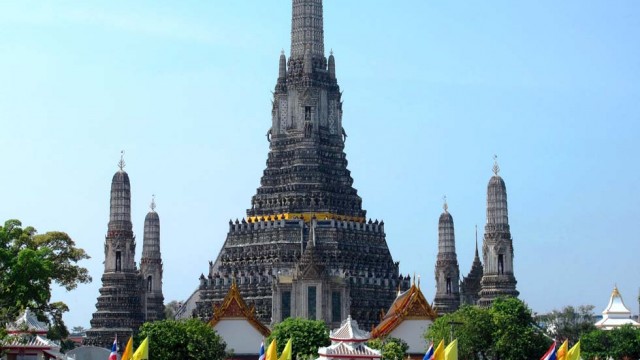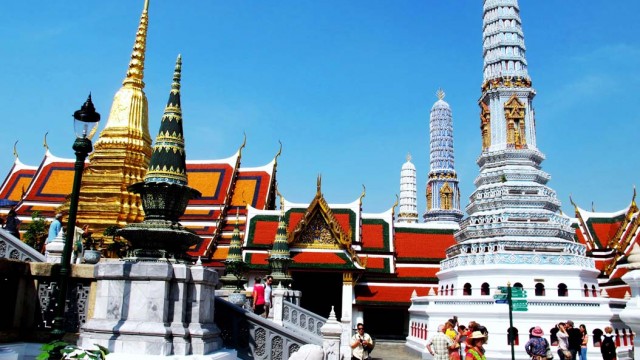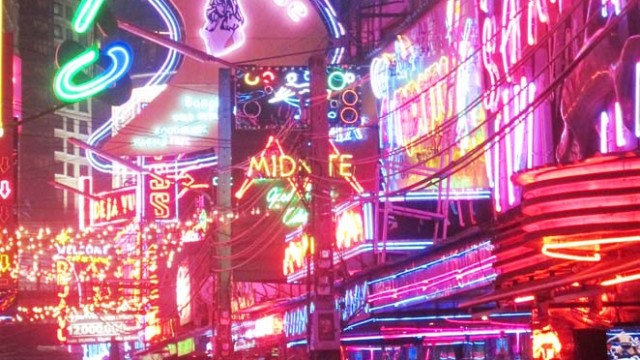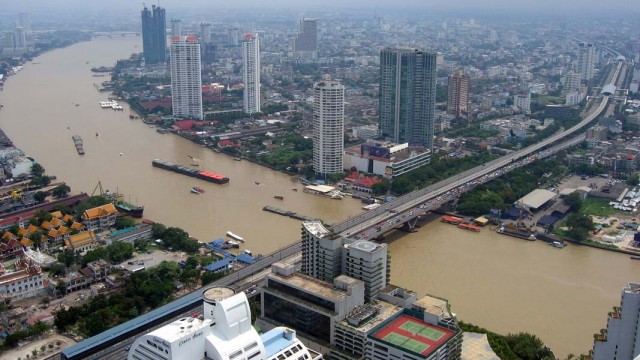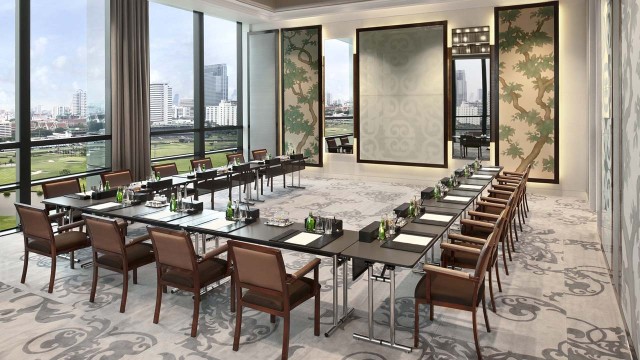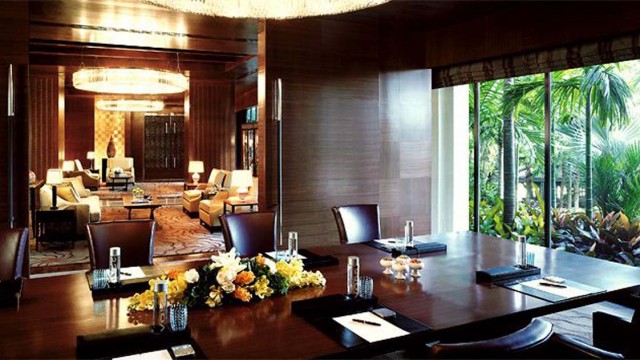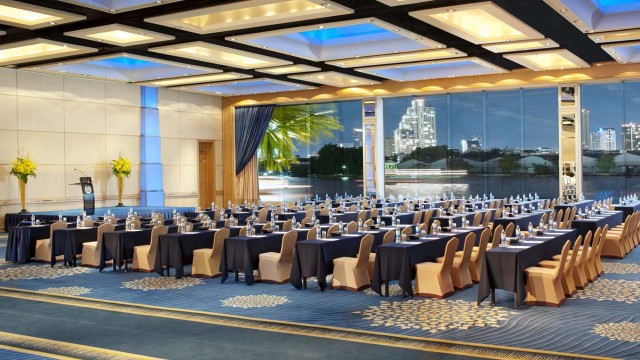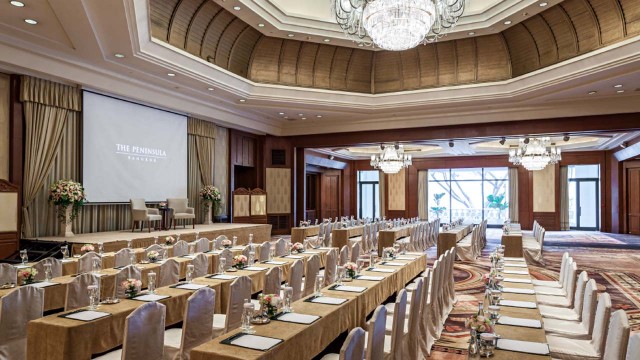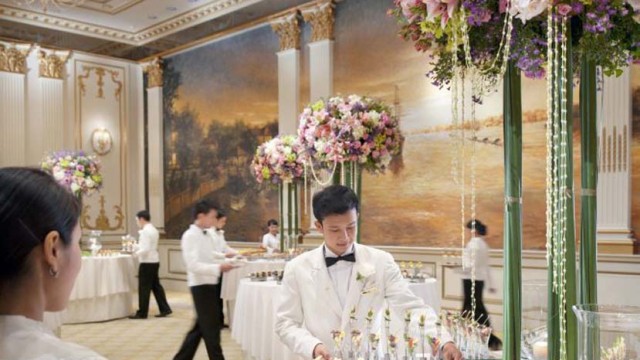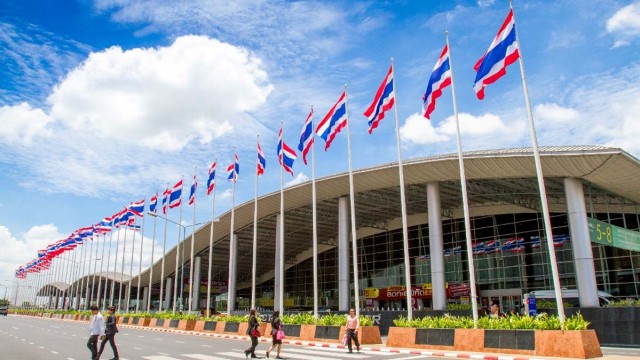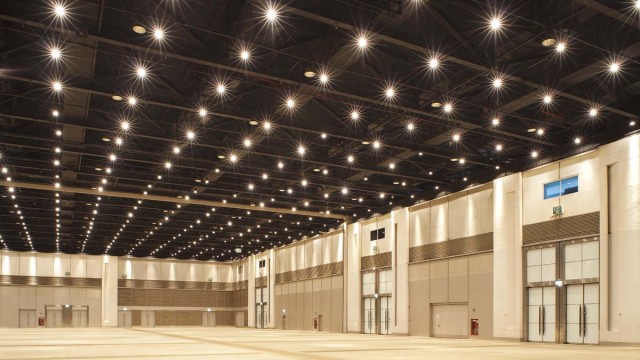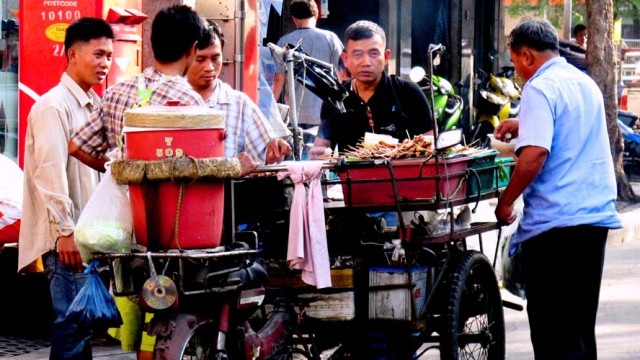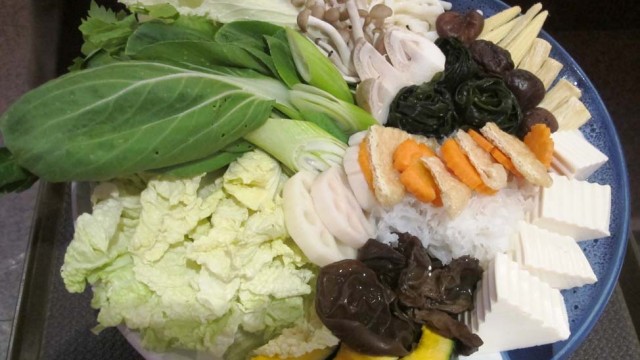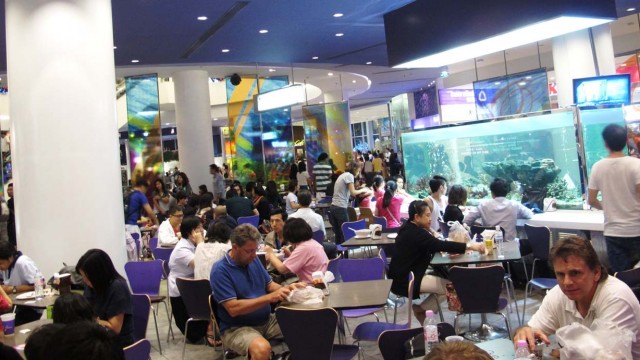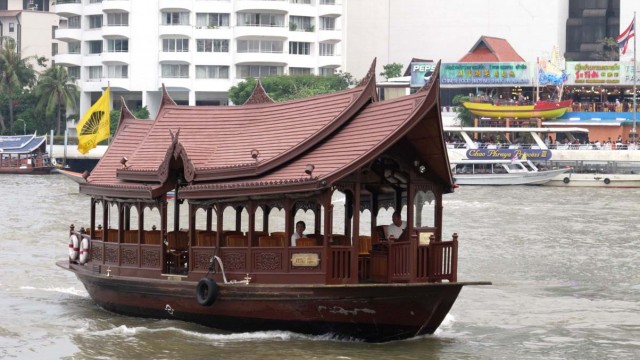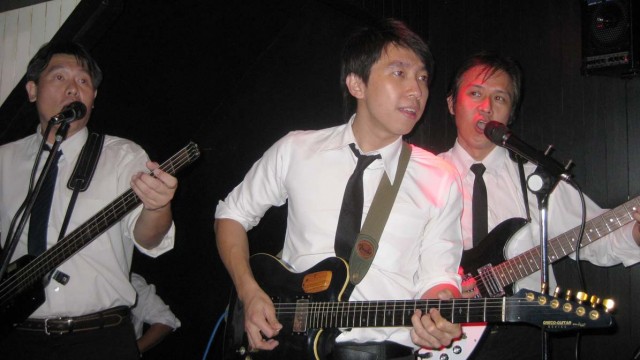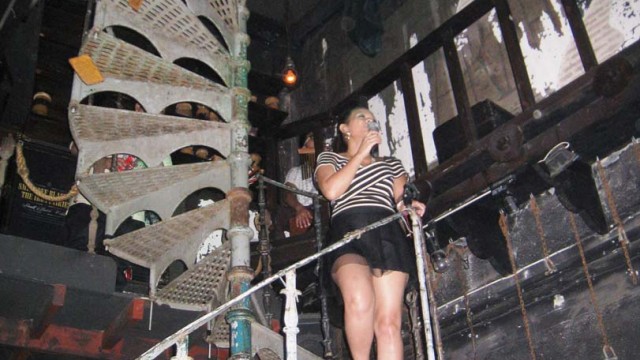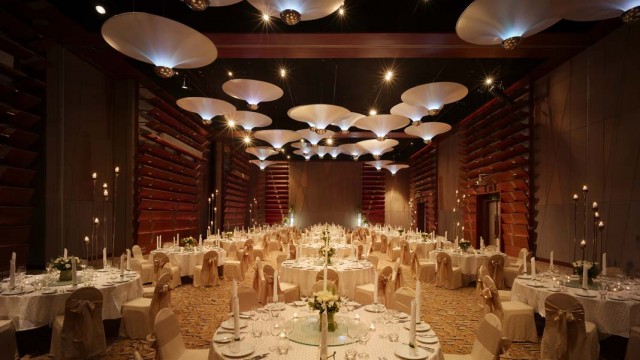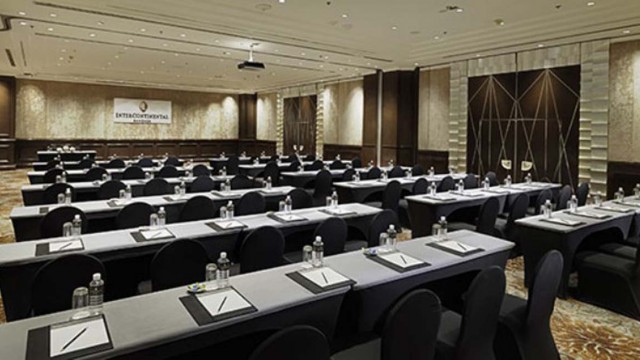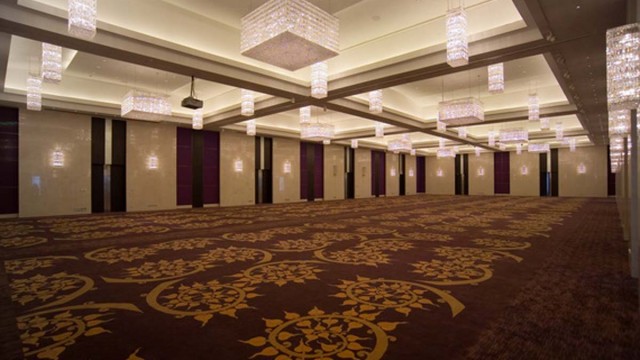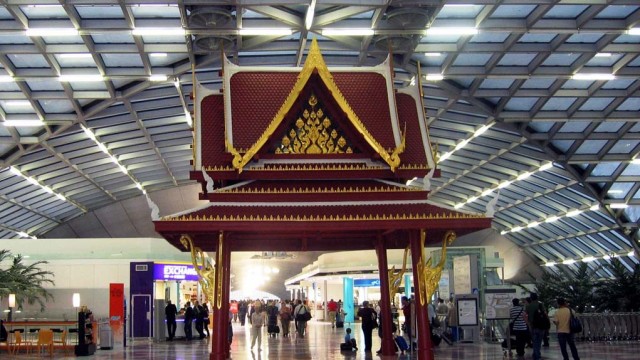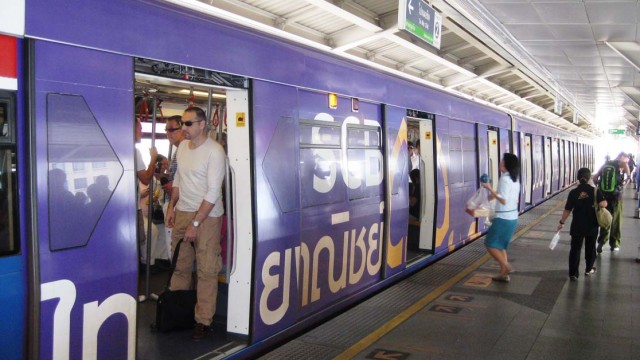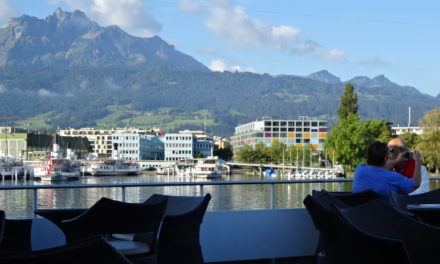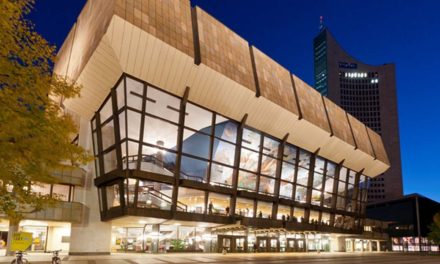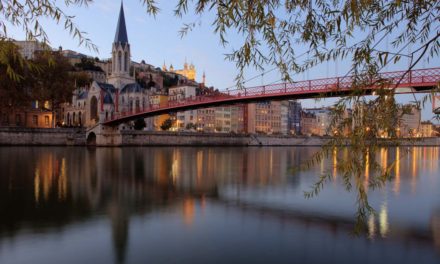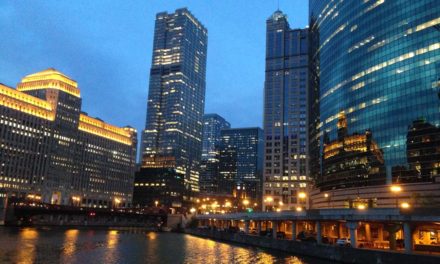Bangkok is a quintessential Asian metropolis, offering rich cultural attractions, limitless shopping opportunities, lively nightlife and its distinct culture and renowned hospitality. Business travelers and visitors from around the world discover that it has all the comforts of home packaged in a chic, exciting mix of modern and traditional living. And that also makes Bangkok, Thailand a unique city for memorable meetings, incentives, conventions and special events functions.
The uniqueness of the food, architecture, language, customs and religion stimulate the senses and visitors feel safe and confident in moving around by themselves. Thai culture is evident everywhere, in Buddhist rites which take place in numerous temples, in the succession of festivals that occur throughout the year, and at local markets where locals haggle politely for everything from food to clothing.
One of south-east Asia’s leading countries is a great choice for meetings and events. It has been in the MICE business for many years and has acquired the skills needed to successfully host a major convention or exhibition for thousands or a business or incentive meeting for top executives or the general public.
While the Thai language remains largely incomprehensible to most visitors, English is spoken in most hotels, shops, restaurants, banks, international offices, BTS and MRT stations (mass transit) and car rental offices. Road signs are in both Thai and English. Thailand uses its own currency, the Baht, but major credit cards as well as travellers’ cheques in major currencies are generally accepted in leading hotels, department stores and some shops. ATM machines accept all major credit cards.
Tipping is not part of traditional Thai life but it has become common in many hotels and restaurants used by visitors.
The two most important things to most Thais are the Royal family and the Buddhist religion. Visitors need to respect this and act accordingly. Do not show disrespect for any member of the Royal Family, the Grand Palace and places of worship. Treat Buddha statues and images with utmost respect and remove shoes when entering temples. Women do not touch Buddhist monks and do not hand anything directly to monks.
Meetings in Thailand
This has been helped along with the establishment of the Thailand Convention and Exhibition Bureau (TCEB), a public organization tasked with promoting and developing business events in Thailand. Since 2004, TCEB has worked toward establishing Thailand as Asia’s premier business events destination, by providing flexible, service-oriented support to meeting-goers, incentives winners, convention attendees and exhibition participants.
Visitors are surprisingly uniform across the different MICE categories: corporate meetings 25% market share), incentive travel (24%), international conventions (33%) and international exhibitions and fairs (18%). A total of 919,164 international business event visitors were attracted in 2014, generating revenue of US$2.69 billion. Top source countries were China, India, Malaysia, Singapore, USA and Australia.
The market is growing significantly with 1,036,300 business visitors expected in 2015 earning the Thai economy US$3.55 billion. Conventions continue as the largest market segment.
Bangkok is popular for conventions, and the primary but there are other cities and locations that can provide additional facilities and attractions or hold the whole event themselves. With at least five first-class convention centers, more than 300 hotels, and around 60,000 hotel rooms in the city centre, the choice for meetings and conferences in Bangkok is immense. There are upwards of 15 million people in the city so it’s no surprise to discover that sightseeing, shopping and entertainment facilities are all first class.
To be sure, while Bangkok is the center of the MICE industry, many other cities and locations throughout Thailand contribute to its overall popularity.
Logistics in Bangkok
Bangkok’s Suvarnabhumi Airport, located about 40 minutes from downtown, is a major flight hub for the Asia Pacific region. It was built on a green-fields site about seven years ago and is currently undergoing further major development. Suvarnabhumi currently has a capacity of 45 million passengers per year and there are flights to most of the major countries in the world by more than 100 international airlines. The airport is currently being expanded to an ultimate capacity of 80 million passengers a year.
Transportation from the airport to the city is by Airport Rail Link, an above-ground system that connects with the BTS Skytrain in the city. Alternative there are air-conditioned metered taxis which will take you anywhere within the city or into outlying areas. Some hotels offer a limousine service and it is possible to even travel by helicopter if you are staying at the Peninsula Hotel.
Don Mueng Airport was the international airport before Suvarnabhumi was built. It has in recent times become the airport from which some of the low-cost airlines operate, as well as a major cargo hub and VIP arrival point. The airport is currently being improved and enlarged as demand grows for services.
The MRT is the subway train system. Only one line is in operation at present but more are under construction. The system serves part of the central city and specific attractions such as the Queen Sirikit National Convention Centre, the Chatuchak Weekend Market, Lumphini Park and the main Bangkok railway station. The service operates 6am to 12pm and fares vary according to distance.
The BTS or Sky Train is an elevated service with two routes. These connect many of the city’s best hotels and major shopping centres and also the Chatuchak Weekend Market. Services operate from 6am to 12pm. There are connection points between the BTS and the MRT but they operate on separate ticketing systems and combined fares are not offered.
Metered Taxis are available everywhere and fares are remarkably cheap. A typical fare from the airport is Bt250 (US$8) and around the city fares rarely rise above Bt100 (US$3). Some drivers can speak English but it is a good idea to have destinations written in Thai to stop confusion. Taxis are hailed on the streets or are available at hotels.
Tuk-tuks are three-wheeled motorised taxis popular for short journeys. Fares must be bargained in advance and while they are fun to use once their value is restricted in most areas.
Bangkok has an extensive bus system of air-conditioned and non air-conditioned vehicles which are the cheapest form of transport in the city. Because they have no English signs and route maps are not readily available for visitors they have limited use.
River taxis and ferries ply the Chao Phraya River. Some are just cross-river ferries while others serve the many landing stages on both sides of the river.
Thailand is a very easy country to visit. Visitors from most countries receive a visa on arrival that is valid for 30 days. MICE delegates are accommodated in special immigration gates at the airport so transiting is easy. The Thailand Convention and Exhibition Bureau will provide assistance with arrival and transport. Delegates receive a free wi-fi card and a BTS transport card for use while in Bangkok and individual hotels and some shopping centers provide additional services and discounted purchases. All in all, life as a MICE delegate is pretty good.
Hotels in Bangkok
There are hotels all over the city and most have meeting rooms suitable for overseas delegates. There are three areas, however, that I consider to be the best. Each has classic facilities, excellent transport connections and plenty of after-hours shopping and amusements.
Ratchaprasong Hotels
Ratchaprasong is in many ways the heart of the city. It has been a bustling hub of business and pleasure for over 50 years, and today it is Bangkok’s premier up-market shopping and dining district. It is where high-end hotels and upscale residences, shops, restaurants, tea shops and spas happily co-exist with traditional Hindu shrines, modern Thai mall culture and lively street stalls. Some of Bangkok’s best hotels are here and all have MICE facilities.
St Regis Bangkok is one of the newest resorts. With 176 stunning rooms and 51 suites ranging in size from 45-250 square metres, this is a great hotel. A recent stay demonstrated to me that the hotel is very serious in providing the true ‘art of living experience’ with an exclusive spa, well-appointed exercise room, outdoor swimming pool and contemporary poolside cafe. There is 24-hour butler service to every room. Meeting facilities include the Astor Ballroom – it provides 515 sq. m (5540 sq. ft.) and four small rooms ranging from 58 to 105 sq. m. Naturally there is a state of the art business centre.
The Anantara Siam Bangkok Hotel (354 rooms and suites) is immediately next door. Rooms range in size from 42 square meters through to 344 square meters for the Presidential suite. There is a choice of award-winning restaurants and what is probably Bangkok’s best Sunday brunch. The spa, outdoor swimming pool and 24-hour health club are all superb while the cooking school is a must for culinary enthusiasts. The business center offers a full range of services while rooms equipped with advanced lighting, audio-visual and staging capabilities cater for up to 1000 guests (814 sq. m.). Other rooms are available for 15-700 guests.
Just meters away, the Grand Hyatt Erawan Bangkok has 380 guest rooms ranging in size from 40-240 square meters. This hotel has extensive meeting facilities with 14 event venues over three levels. The largest is the ballroom (920 sq. m.) – it can accommodate 1500 for cocktails. The Campus is a very contemporary area designed to inspire creative thinking which is better described as a ‘learning and social centre’ rather than a meeting venue. For premium gatherings The Residence has been designed to provide personalized service with exceptional cuisine.
The Renaissance Bangkok Ratchaprasong Hotel is around the corner. It has 333 guestrooms and suites and the mandatory spa, swimming pool and 24-hour fitness center. The hotel has 14 meeting rooms ranging in size from 36-640 sq. m. One particularly interesting facility is called Studio R which is designed like a spacious apartment and is divided into 11 meeting rooms opening on to a communal zone and open kitchen.
Across the road is the Intercontinental Bangkok with 381 luxury guest rooms, including Club InterContinental rooms and a range of suites varying in size from 45-250 square meters. The hotel has an ambience of understated luxury and this extends to the rooftop swimming pool, the many restaurants and bars and to the Spa Intercontinental where I recently experienced a relaxing treatment to die for. The meeting and convention facilities here are among the city’s most spacious and include the 860 sq. m. Grand Ballroom and 21 other meeting areas. The hotel also has a dedicated exhibition area for up to 2000 visitors.
The Holiday Inn Bangkok with 379 rooms in two towers is a more cost effective than some of the other hotels. It has a fitness center, a pool, sauna, children’s playground, and 3 dining options. The hotel has a ballroom – it can seat up to 900 theatre style.
The 505 room Centara Grand Hotel is home to the Bangkok Convention Centre at CentralWorld (see Major Meeting and Convention Facilities). With 55 floors the hotel offers spectacular city views from its guestrooms and restaurants. A lifestyle complex on the 26th floor includes the award-winning SPA Cenvaree along with a fitness center, tennis courts and an outdoor pool with sundeck.
Hotel Novotel Bangkok Platinum Pratunam is a 283 room 4-star family-friendly hotel in the heart of the fashion district, ideally located above Platinum Mall. The hotel has a restaurant and two bars, but these are complemented by many others in the mall. There is an outdoor pool, fitness center and Turkish bath. Meeting rooms of from 25-270 sq. m. can accommodate up to 250 people.
The Ratchaprasong Square Trade Association can help with co-ordination of the various properties in this area to ensure that all delegates can stay within close walking distance of all facilities.
Bangkok River Hotels
The Bangkok River is often called the lifeblood of the city and this is the second great location for conventions, meetings, events and exhibitions. Eight luxury hotels on the banks of the Chao Phraya River formed the Bangkok River Partners in 2014 to promote the river and this provides planners a great opportunity for conventions and functions.
With a combined total of 4,152 rooms and suites, 13 state-of-the-art ballrooms, 112 meeting rooms and 42 restaurants, the eight hotels can meet the demands of any event. Outside the hotels there are six lively markets, the famous Asiatique night market, and seven Muay Thai boxing shows each week.
Anantara Bangkok Riverside Resort and Spa has 408 rooms and suites set in a tropical garden. There are 10 bars or restaurants, a pool and Jacuzzi, a cooking school, and the renowned Anantara Spa. MICE facilities include the spacious Chaophraya Ballroom which is capable of hosting a company retreat, conference, cocktail party or banquet for as many as 800 people, the Garden Room which seats 300 people, Ballroom A which is a venue for mid-sized corporate gatherings of up to 260 people, and other rooms which seat from 10-100.
Chatrium Hotel Riverside Bangkok has 396 rooms ranging in size from 60 to 460 sq. m. There are six restaurants and bars, a fitness center, an infinity pool and the Nemita Spa. Meeting facilities are not as extensive as some other hotels but the Chatrium Ballroom (630 sq. m.) and its beautiful terrace beside the river is an impressive venue and there are meeting rooms of from 23-270 sq.m.
Mandarin Oriental Bangkok has been attracting travelers for more than 135 years. It is timeless yet contemporary, classic yet cutting-edge, with a unique blend of luxury and comfort. The hotel has 339 elegant rooms, 35 luxurious suites, innovative restaurants, fitness centre, and a world-class spa. The hotel’s meeting facilities range from the lavish 510 sq. m. Royal Ballroom to meeting and boardrooms of 55-204 sq. m.
The Millennium Hilton Bangkok is a 30-storey high-rise on the Thonburi side of the river. All 533 rooms have wonderful city views and luxury features and there are eight food and drink venues, an outdoor infinity pool and lounge on the sun deck, gym, sauna and business centre. Meeting facilities include the 594 sq. m. Grand Ballroom, the smaller Thonburi Ballroom (228 sq. m.) and 10 meeting rooms of 63 or 90 sq. m.
The 370 room Peninsula Bangkok is directly opposite the Mandarin Oriental. It has all the facilities you would expect including multiple dining outlets, pool, fitness centre, tennis courts and garden spa. There are meeting facilities from boardrooms that cater to small groups of up to 30, including the striking Paribatra Aviation Lounge with an adjoining private helipad, to the superb Sakuntala Ballroom which can accommodate over 800 guests.
Ramada Plaza Bangkok Menam Riverside has 525 modern, tastefully decorated guestrooms, and it offers dedicated smoking and non smoking floors, an outdoor pool, sun terrace, luxurious wellness & spa centre, and a choice of 5 international restaurants, bar & lounges. There are 22 meeting & banqueting rooms that can accommodate 10 to 650 people, and a business centre.
Royal Orchid Sheraton Hotel and Towers has 726 guest rooms with unobstructed river views. There are four in house restaurants, family friendly leisure facilities, including two swimming pools, a spa, a tennis court, a large garden area and the Link@Sheridan which is a modern style business centre. The hotel provides 22 well-appointed function rooms, many with river views including the Royal Orchid Grand Ballroom (946 sq. m.), which can accommodate up to 1,150 people.
Shangri-La Hotel Bangkok has 802 luxurious guestrooms in two adjacent towers. There are 6 dining outlets and 3 Bars, a business centre, a riverside swimming pool, tennis courts and a well-equipped fitness centre. CHI, The Spa at Shangri-La, offers some of the largest private spa suites in Bangkok and I can attest to fabulous service. The magnificent Grand Ballroom can accommodate over 1,000 guests at an elegant banquet, up to 1,500 people for cocktail receptions, or 1,600 delegates seated theatre-style. 19 function rooms are also available for smaller gatherings.
Sukhumvit Road Hotels
The third area worth considering is Sukhumvit Road. This is one of Bangkok’s major thoroughfares and it is lined with some excellent hotels. The side sois also house some large properties and overall there are probably more hotel rooms here than anywhere else in the city.
Some of the major properties here are the JW Marriot Hotel Bangkok (441 rooms), Landmark Bangkok (399 rooms), Sofitel Bangkok Sukhumvit (345 rooms), Ambassador (760 rooms), Sheraton Grand Sukhumvit (420 rooms), Westin Grande Sukhumvit (362 rooms) Holiday Inn Bangkok Sukhumvit 22 (300 rooms) and the Imperial Queens Park (1250 rooms). All have MICE facilities. They are connected by the elevated BTS which runs along the centre of Sukhumvit Road.
Conventions in Bangkok
Impact
IMPACT Muang Thong Thani is probably Asia’s leading venue. The Center, some 15 kilometers north-west of the Downtown area, is equipped with state-of-the-art integrated facilities and more than 140,000 square meters of floor space. It comprises four large multi-purposed buildings, 52 meeting rooms, 2 ballrooms, 2 banquet halls, 2 outdoor areas and the 4.5 star Novotel Bangkok IMPACT. The venue also offers a wide range of nine restaurants onsite and 30 other dining outlets.
Things here are on a huge scale. Impact Challenger is claimed to be the world’s largest column-free hall with an area of 60,000 square meters. The Royal Jubilee Ballroom can accommodate 3500 people in 3500 square meters of space while Impact Arena can seat 12,000 people. Naturally there are all the necessary auxiliary facilities like business centers, VIP rooms, press centers, childcare centre, first aid centers, banks, retail shops and a spa and massage centre.
The Bangkok International Trade and Exhibition Centre (BITEC)
This was established in 1997 and it offers world-class MICE services and facilities that can accommodate events of all sizes. There are six linked column-free halls totaling 50,400 square meters to comfortably accommodate major exhibitions, conventions, and there are 24 meeting and function rooms. The venue is about 10 km south of the downtown area.
The facilities are currently being expanded by the addition of a 3 billion baht (US$100 million) new exhibition, convention and concert hall with a 25-meter ceiling.
Queen Sirikit National Convention Centre
This was officially opened in 1991 as Thailand’s first purpose-built convention center. Its inaugural event was the 46th World Bank/International Monetary Fund’s Annual Meeting. It was a momentous success and heralded QSNCC’s important role in spurring the tremendous growth in meetings, conventions and exhibitions held in Thailand. Over the past two decades, QSNCC has hosted numerous prestigious gatherings at national, regional and global levels, earning a worldwide reputation as a well-run and well-managed national convention center.
QSNCC and its highly functional facilities can comfortably accommodate up to 6,000 people theater-style in the Plenary Hall, which can be divided into 3 sound-proofed sections of approximately 1,500 sq m each. The Ballroom and reception areas are suitable for such functions as a spectacular grand opening ceremony, gala reception and banquet. Gross exhibition area is in excess of 20,000 sq m.
Bangkok Convention Centre at Centralworld
Accommodating from 10 to 6000 delegates, this self-contained facility is the second biggest convention venue in the central business district. Major facilities are the pillar-less Convention Hall (5250 sq. m.) the World Ballroom (960 sq. m.), and the Lotus Suite complex consisting of 15 rooms available in a variety of sizes from 58-412 sq. m. accommodating 10-400 people.
The complex is connected to Central World which is the largest shopping complex in Thailand with more than 500 stores, 200 fashion brand shops, 100 restaurants, 18 cinemas and the largest supermarket in Thailand. In-house accommodation is provided by the 505 room Centara Grand Hotel.
Royal Paragon Hall Exhibition and Convention Centre
The Royal Paragon Hall is one of Asia’s most modern halls, and is strategically located on the 5th floor of the Siam Paragon Shopping Center, in the heart of Bangkok. It has on offer 3 main halls, 6 breakout rooms (40-152 sq. m.), a VIP room and backstage areas adaptable to suit innovative functions of all types imaginable.
With a total combine space of 12,000 square meters, these three impressive and ultramodern multi-purpose halls are fully furnished and equipped with cutting edge technology, as well as first-rate professional acoustic and lighting facilities.
Things to Do in Bangkok
It is not hard to be overwhelmed by the size of Bangkok and the vast number of attractions offered. From exotic temples which underscore Thailand’s strong Buddhist history through modern shopping malls and fascinating markets which make shopping an integral part of any Bangkok visit to exotic, plus its sophisticated and sometimes raunchy nightlife, Bangkok has it all.
No one should visit Bangkok without making a visit to the Grand Palace and the Temple of the Emerald Buddha. This was constructed when Bangkok was chosen of the capital of Siam. The Grand Palace formerly served as the residence for the royal family. Today the whole complex is swarming with visitors who come to enjoy the architecture, the throne halls and the amazing ambience. The palace opens daily and proper attire is necessary.
There are sparkling wats – monastery temples in Thailand – everywhere you look in Bangkok, so it is impossible to see them all. Two are outstanding. Wat Pho is a neighbor to the Grand Palace and it contains a gigantic gold plated Reclining Buddha some 46 meters long. This is also home to the most well-known Thai massage school and visitors can enjoy a massage while visiting the temple. Wat Arun (the Temple of Dawn) is a famous landmark across the river from the palace. It is best known for its porcelain and mirror encrusted 79 meter central pagoda which sparkles in the sun.
Other wats worth visiting are Wat Mahathat which offers meditation classes for foreigners; wat Ratchabophit which has a Thai-style exterior but a European-style interior; Wat Ratchanatdaram with its main 36 meter spire surrounded with 37 others; and Wat Bowon Niwet with its ancient beautiful Buddha image which is where several Thai kings have resided during their monkhood.
At least one museum should be on everyone’s itinerary. The National Museum is outstanding both because it is situated in the palace of a former king but because it exhibits a huge variety of antiquities and objects d’ art representing the cultural heritage of Thailand. Other visits will depend on your specific interests.
I enjoy the three-story Vimanmek Mansion Museum with its extensive royal memorabilia which is located in the world’s largest teak building. Also worth visiting is Suan Pakkad Palace where the complex of five Thai houses contains an extensive collection of Asian art and antiques including items from the prehistoric Ban Chiang civilization of north-east Thailand. Jim Thompson helped restore the Thai silk industry after World War II and his wonderful house, consisting of a collection of old Thai buildings, is filled with Asian art.
If art is your thing, the National Gallery Museum exhibits both traditional Thai and contemporary art and also some oil paintings by His Majesty the King. The Siam Discovery Museum has some modern techniques for showcasing historic stories of the Thai nation. The Thai Life Exhibition at the Thailand Cultural Centre displays the history of the Thai people and different aspects of Thai culture.
The Chao Phraya River is a major drawcard. An express river boat serves many wharves along the river including Chinatown and the Royal Palace. Charter boats can be used to visit attractions such as the Royal Barge Museum and the Siriraj Bimuksthan Museum with its 200-year-old history display. There are also river and canal tours where you can explore how Thais live along the canals or visit a floating market.
Thai cooking schools have boomed in popularity in recent years and it is now possible to do anything from a half-day course to an intensive two week school. Some of the schools are associated with the major hotels but there are many others. Increasingly a short course is being included in many MICE programs.
Meditation is a popular aspect of Buddhism to help promote inner peace and happiness. Several meditation centres offer classes in English for foreign visitors who wish to find out more about Buddhism and Buddhist meditation.
Spas have existed in Thailand for many years but now they have been taken to a completely new level. Many major hotels and some independent operators have luxury spas where you can go to relax in tranquil surroundings with a variety of treatments on offer to rejuvenate the body and mind. Elsewhere, moderately priced spas are sprouting everywhere so locals and visitors can enjoy an hour or two of relaxation.
Shopping in Bangkok
There are many areas throughout the city where shopping is king. Bangkok is fortunate in having some of the most up-market shopping malls in the world, extensive bargain markets, and everything in between.
The Siam Square-Ratchaprasong-Ploenchit area has top department stores and luxury shopping malls: Siam Discovery, Siam Paragon, MBK, Central World, Gaysorn Plaza, Amarin Plaza, Central Department Store, Central Embassy and many more. There are plenty of street stalls here at night to complement the more up-market offerings.
Pratunam-Phetchaburi is where you head for ready-made clothes at bargain prices. Platinum Fashion Mall has over one thousand outlets specializing in wholesale fashion goods but retail buyers are welcome. This area is also home to the largest IT mall in Thailand and to the Pratunam market which is one of the city’s renowned garment centres.
Sukhumvit Road is one of Bangkok’s main thoroughfares. It is lined with shops, boutiques and modern shopping plazas from soi 3 through to soi 63. Some of the major malls along here include Terminal 21 (a personal favorite of mine), The Emporium and Robinson department stores, Emquarter a new luxury mall filled with high-end brands and Emsphere. Off in the side sois (small streets) there are others smaller malls, restaurants and lifestyle centers.
Silom Road-Patpong-Charoenkrung Road is an extensive area with many specialist shops and boutiques, well-known retailers and several shopping malls. Street stalls abound particularly in Patpong’s famous night market. Silom Road leads into Charoenkrung Road which parallels the river and there are many gem and jewelery shops her as well as the Oriental Plaza and River City shopping complexes.
Asiatique The Riverfront has more than 1000 shops selling souvenirs and decorative items. As well there are upwards of 40 restaurants, the longest boardwalk along the Chao Phraya River and Asiatique Sky, a 60-metre high Ferris wheel. There is a free shuttle boat from the Saphan Taksin BTS station.
Chinatown is centred on Yaowarat Road and Sampheng Lane. It offers a profusion of gold shops, many excellent restaurants, the Ban Mo Jewellery Street, the Bo-be Market and the Phahurat Cloth Market. Not far away is Pak Khlong Talet flower market which is a ‘must-see’ venue late evening or early morning. Just nearby is Yod Piman River Walk with 300 meters of riverfront promenade and more than 40 shops selling food, spa products and handicrafts.
Chatuchak Weekend Market is often called the world’s largest market. It is open on Saturday and Sunday and is a Bangkok landmark where you can buy everything from clothing to potted plants and animal pets. It is a paradise for browsers and bargain-hunters alike. Adjacent to the market are other areas that open the whole week selling similar things, and furniture and home decor.
Thailand has developed a range of traditional handicraft products that have become popular with international visitors. Among these are wicker ware, hand-painted porcelain, silk, bamboo basketry, hill-tribe crafts, silverware, woodcarving products and decorative items made from coconut shells.
A Value Added Tax refund can be claimed by visitors who are departing from an international airport subject to certain conditions.
Entertainment in Bangkok
Thai food is renowned throughout the world so it is no surprise to find great Thai restaurants here together with amazingly cheap street food. But Bangkok fare is much wider than this. Chinese, Japanese, Vietnamese, Indian, Italian, French and Mediterranean food is widely available, prepared by experience chefs from the food’s countries of origin. Fusion food where Western or Japanese dishes are laced with Thai flavours is becoming increasingly popular.
Several Bangkok restaurants regularly feature amongst Asia’s best and the top hotel restaurants also have an enviable reputation. Visitors can experience this both during and before/after a conference or incentive.
Thai food can be found everywhere and even eating on the street is considered safe. There are food courts in large shopping centres, traditional markets, open-air garden restaurants, seafood restaurants where you select your own product then have it cooked for you, and dinner cruises along the Chao Phraya River.
Western fast-food is popular with Thailand’s youth so there are McDonalds, KFC, Dunking Donuts, Starbucks, and so on in every district. It seems to make little sense for visitors to eat in these places but they offer a comfortable ambience for some people.
Local Thai beer and whiskey is popular but is not as cheap as you might expect in restaurants and bars due to the tax on the product. Nevertheless local beer brands such as Chang and Singha are popular with visitors. Juices, soft drinks, milk varieties, bottled water and other beverages are widely available. You can drink everywhere from swanky hotel and rooftop bars to outdoor places with rickety tables on dirt floors. Some come with music and hostesses.
Most people have heard about Bangkok’s raunchy nightlife reputation but many overlook the cultural performances that the city also presents. Places such as the National Theatre, Wangna Theatre, Chalerm Krung Royal Theatre and Thailand Cultural Centre have cultural programs and events on a continuing basis. Cultural shows are also offered at several other less formal locations.
Of particular interest is Siam Niramit where a show with 150 performers reaches international standards in a theatre with a capacity of more than 2000. Before the performance visitors can walk around the complex to see typical Thai houses and many handicrafts and food stalls. Conference dinners can be arranged at the venue.
Thai boxing is featured in two stadiums on alternate nights. Contestants are allowed to use almost any part of their body and the playing of traditional music during bouts helps build excitement.
You see massage parlours all over town but you need a little education on what is on offer. Traditional Thai massage is always available and oil massage is very popular, then in some there can be all sorts of additions to the service at increasing price. It will all be made clear to you so there is little chance of getting more than you expect.
Music choices extend to jazz, pop, rock and hip-hop in hotel bars and other venues. The Thai King composers and plays jazz and this means that many Thais have an interest in this genre.
The famous girly bars for foreigners at Patpong, Soi Nana and Soi Cowboy still exist but they are more visitor friendly than in the past. You are welcome to sit inside or outside with a drink in hand talking or watching the girls in their bikinis. Drink prices can be high particularly if you decide to buy a lady’s drink but you are not likely to be hustled and at most times the ambience is bright and friendly. Some girls are available for after-time activities.
Updated. Initially published August 24, 2015.

